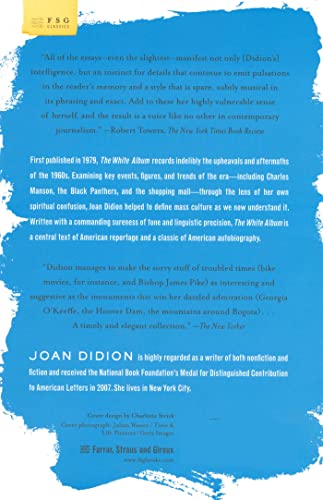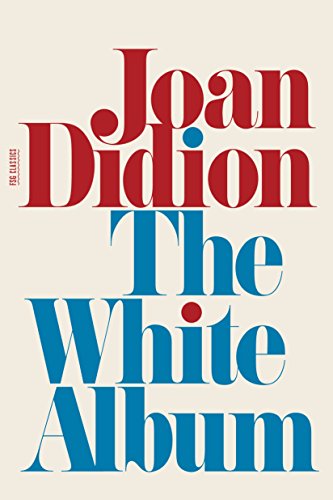The White Album: A FSG Classics Edition
The White Album is a piece of music history that has stood the test of time since its release in 1968. Crafted by the iconic rock band The Beatles, this double album features a diverse range of musical styles and experimentation that showcased the band’s versatility and creativity. From the melodic crooning of “Blackbird” to the chaotic energy of “Helter Skelter,” The White Album remains a timeless masterpiece that continues to capture the hearts and minds of listeners around the world. Join us on a journey through this musical tapestry as we explore the timeless beauty and innovation of The White Album.


The White Album Plot Summary
The White Album, written by Joan Didion, is a collection of essays that were originally published in various magazines throughout the 1960s. The book is a reflection on the tumultuous time in American history, particularly focusing on the cultural and political upheaval of the 1960s and 70s. The essays take the reader through a variety of topics, including music, social unrest, and personal experiences, all woven together with Didion’s distinct voice and style.
The White Album opens with the titular essay, which describes Didion’s personal struggles during a period of significant change in her life and the world around her. She reflects on her mental state at the time, describing how she felt disconnected and detached from reality. This essay sets the stage for the rest of the book, as Didion navigates the complexities of the era with her characteristic introspection and sharp commentary.
Throughout the book, Didion delves into a wide range of topics, from the Manson Family murders to the Black Panther Party. She explores the impact of these events on society and reflects on their significance in shaping the cultural landscape of the time. The essays are not only a commentary on the events themselves but also on the broader themes of power, authority, and identity.
One of the most notable essays in The White Album is “The Women’s Movement,” in which Didion reflects on the feminist movement of the 1960s and its impact on society. She discusses the ways in which women were marginalized and oppressed during this time, and how the movement sought to challenge these societal norms. Didion also reflects on her own experiences as a woman in a male-dominated world, shedding light on the struggles and challenges she faced in a changing society.
Another key essay in the collection is “The White Album,” which explores the rise of the counterculture movement and its impact on American society. Didion reflects on the music, art, and literature of the time, examining how these cultural forms reflected the social and political upheaval of the era. She also explores the influence of drugs on society, and how individuals used substances like LSD to explore altered states of consciousness.
In “The White Album,” Didion reflects on the ways in which the counterculture movement challenged traditional social norms and sought to create a more egalitarian society. She also explores the darker side of the counterculture, reflecting on the violence and unrest that characterized the era. Through her essays, Didion paints a vivid picture of a society in turmoil, struggling to find its place in a rapidly changing world.
Throughout the book, Didion’s prose is elegant and precise, with a keen eye for detail and a sharp wit. She captures the complexity of the era with nuance and depth, offering a unique perspective on the events and people that shaped the 1960s and 70s. Her writing is at once personal and universal, inviting the reader to reflect on their own experiences and the state of the world around them.
The White Album is a powerful and thought-provoking collection of essays that offers a unique insight into a tumultuous period in American history. Through her exploration of the counterculture movement, the feminist movement, and the changing social landscape of the time, Didion paints a vivid picture of a society in transition. Her writing is poignant and insightful, offering a compelling commentary on the events and ideas that shaped the 1960s and 70s.
In conclusion, The White Album is a seminal work that captures the essence of a pivotal moment in American history. Didion’s essays are a testament to her talent as a writer and her keen insight into the complexities of the human experience. Through her exploration of the cultural and political upheaval of the era, she sheds light on the struggles and challenges of the time, offering a compelling and powerful reflection on the state of American society. The White Album remains a timeless and essential read for anyone interested in understanding the social and political dynamics of the 1960s and 70s.
The White Album Key Takeaway
One of the key takeaways from Joan Didion’s iconic book, The White Album, is the exploration of cultural and personal dissonance during the tumultuous 1960s and 70s. Through a series of essays that blend Didion’s personal experiences with larger societal shifts, she offers a poignant reflection on the complexities of identity, power dynamics, and the search for meaning in a rapidly changing world.
Didion’s deep introspection reveals the ways in which she grapples with the disconnect between her own privileged upbringing and the social upheaval happening around her. She confronts the contradictions between her own sense of detachment and the intense emotions that pervade society, particularly during the peak of the counterculture movement and the Vietnam War.
In addition to this, Didion also examines the ways in which memory and history intersect, shaping our understanding of the present. She delves into the myths and realities of California, the media’s influence on public perception, and the ways in which personal narratives are often intertwined with larger cultural narratives.
Overall, The White Album serves as a powerful meditation on the complexities of the human experience, offering readers a glimpse into the intricate web of personal and societal forces that shape our lives. It reminds us of the importance of grappling with our own contradictions and seeking to make sense of the often chaotic world in which we live.
Conclusion
The White Album is a collection of essays by Joan Didion that touch on a variety of topics ranging from Hollywood to politics to personal experiences. Didion’s writing style is highly introspective and perceptive, providing a fascinating insight into the cultural landscape of America during the tumultuous 1960s and 70s.
In conclusion, The White Album offers a unique and thought-provoking look at history through the lens of one woman’s personal experiences. Didion’s ability to seamlessly blend the personal with the political and the cultural makes for a captivating read that will leave readers reflecting long after they finish the book.
I would recommend The White Album to fans of non-fiction, cultural studies, and those interested in the history of America during the late 20th century. Readers who enjoy personal essays and deep dives into cultural phenomena will particularly enjoy this book.
Overall, The White Album is a poignant and thought-provoking read that offers a fresh perspective on American society during a time of great change.

No responses yet